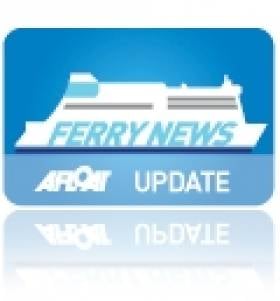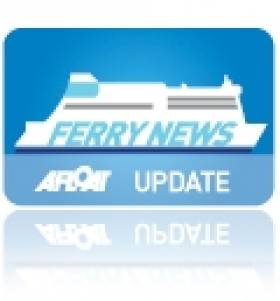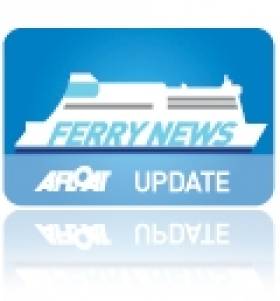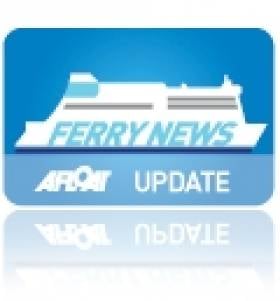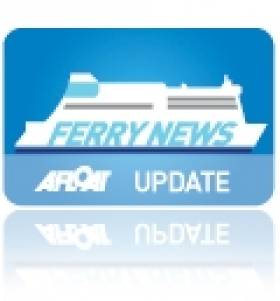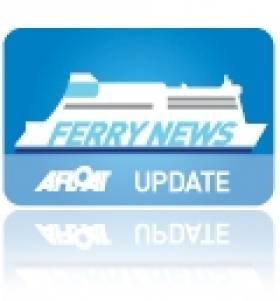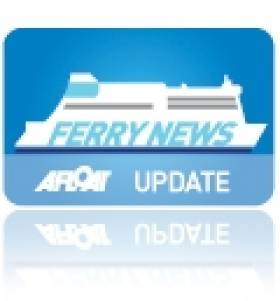Displaying items by tag: Irish Ferries
P&O Ferries Enjoys Increase In HGV Crossings
#NorthSea - P&O Ferries in early January announced that it has seen an 11% year-on-year increase in HGVs crossing between the UK and the continent on its Hull-Rotterdam route, reports Ships Monthly.
The level of trade on this P&O Dutch route amounts to more than 5,000 extra vehicles being carried on the North Sea route during 2015, contributing to a total of 52,000 HGVs.
The route is operated by the giant 59,925 tonnes sisters Pride of Hull and Pride of Rotterdam, among the largest passenger ferries in Europe providing first class facilities for truck drivers too. They each carry 1,360 passengers, 205 cars and 263 trailers. For more on the P&O story, click here and freight boost on their premier Dover-Calais service.
Afloat adds, that leadship Pride of Hull features an 'Irish Bar' and was built in the same year of Irish Ferries, flagship, Ulysses of 50, 938 tonnes. She is the fifth largest ferry in tonnage terms to operate in UK waters.
As previously reported, Ulysses had gone to A&P Falmouth for annual refit and which has since been completed. The cruiseferry departed the Cornish facility last night and at time of writing is bound for Dublin Port having transitted St. Georges Channel.
Added Capacity During Busy Period on Irish Ferries Dublin-Holyhead Route
#AddedCapacity - Added sailing capacity on Irish Ferries Dublin-Holyhead route during the Christmas and New Year period will be introduced to faciliate thousands of passengers looking to travel over the busy season.
The operator is to transfer its cruise ferry, Oscar Wilde from its Rosslare – Cherbourg route into service out of Dublin Port where it will operate alongside the fast ferry Dublin Swift and cruise ferry Ulysses.
On the southern corridor, Irish Ferries' cruise ferry Isle of Inishmore will continue to operate its service as normal between Rosslare and Pembroke.
Pointing to the fact that Christmas is normally their busiest time of the year, Irish Ferries head of passenger sales, Dermot Merrigan said “Our message to our passengers preparing to drive home this Christmas with gifts for family and loved ones is to bring the gifts you wish to give, not just those you can carry - it all goes free on the ferry".
Irish Ferries Recognition of 20 Years Service At Roscoff
As part of celebrations to mark the 20th anniversary of Irish Ferries' services from Rosslare to the French port of Roscoff, a civic reception – attended by the mayor of Roscoff Mr. Joseph Seité and other local dignitaries, chamber of commerce officials, commercial, maritime and tourism representatives from the French region and members of Irish Ferries’ management – was held on board the company’s vessel Oscar Wilde.
During the course of the event, Irish Ferries was praised for the contribution that it makes in promoting tourism and trade in Roscoff and throughout the wider Brittany region and for the investment it has made over the course of two decades, both at sea and ashore.
Pictured at the event is Irish Ferries Managing Director Andrew Sheen, Captain Steven O’Mara and Ole Bockmann who, since the early days of direct car ferry services between Ireland and France, has been director of operations for Irish Ferries at the ports of Cherbourg and Roscoff.
Ireland-France Route Celebrates 20 Years of Service
#Route20thyear – This year Irish Ferries celebrates the 20th anniversary of the Ireland-France link connecting the ports of Rosslare and Roscoff.
Inaugurated in Summer 1995, the service was added to the company's then established continental services to Normandy, via the ports of Cherbourg and Le Havre. The service to provide passengers with a direct service to/from Brittany, a region popular amongst Irish holidaymakers.
Over its two decades in operation, services to Roscoff have recorded some 1,230 ferry arrivals and departures. Passenger carryings on the route are in excess of 1.5 million passengers and 400,000 vehicles.
In recognition of what it terms 'the strong cultural links' that exist between Brittany and Ireland, the intention at the time, according to the company, was to provide a regular and convenient service for Irish and Breton holidaymakers whilst facilitating the development of closer trade links between the two regions.
Since its introduction, the service has continued without interruption serviced in turn by the vessels St. Patrick II, St. Killian II, Normandy and the present cruise ferry, Oscar Wilde.
Today, services to Roscoff form an important part of the wider Irish Ferries Ireland / France route network – one that includes year-round services from Rosslare to Cherbourg and a recently introduced, once-weekly return service from Dublin.
FerryGateway Association Is Joined by Irish Ferries
#NewFerryInitiative - The FerryGateway Association which has been formed by major European ferry operators includes Irish Ferries. The association's other members are; Stena Line, DFDS, P&O Ferries, Viking Line, Tallink/Silja Line, Brittany Ferries and Color Line.
The aim of FerryGateway is to proactively work together to improve sales and distribution of ferry travel. Its first step is the launch of a new systems communications standard for agents and ferry operators.
Hans Björkborg, Managing Director of The FerryGateway Association says: "In Northern Europe alone 125 million passengers travel annually on ferries and online sales between agents and ferry operators has been growing fast. Until now system connections have been supported by out-dated and non-standardised solutions, the new FerryGateway standard is set to change this."
The main advantage with the new FerryGateway xml based communication standard is that a wider range of products and services can be offered for sale.
Hans Björkborg says: "We will also be able to better meet our customers' expectations by being able to offer the full range of ferry products and services. By making selling ferry travelling both easier and more attractive we expect to see growing interest from a wide range of B2B partner organisations."
Besides increasing sales, the new standard will also improve efficiency and lower costs, as agents and operators will only have to maintain one standardised way of system communication.
The standard will be open for all registered users and will be accessible via the ferrygateway.org website.
Agents and operators are already progressing to have the new standard implemented to go live well before the 2016 peak booking season.
New Managing Director of Irish Ferries
#irishferries – Irish Continental Group (ICG) has appointed Andrew Sheen to the position of Managing Director of its Irish Ferries division.
Andrew will assume his new role with effect from the beginning of April, reporting to ICG's CEO, Eamonn Rothwell.
Operations Director since 2012, Andrew has been involved in shipping for over twenty-six years, ten of them with Irish Ferries - first as a sea-going Chief Engineer and, since 2010, in shore-based operations roles.
A Chartered Engineer and Fellow of the Institute of Marine Engineers, he holds a BEng (Hons) degree in Mechanical and Marine Engineering and an MSc in Marine and Offshore Engineering.
Previous appointments include roles in marine consultancy and Engineer Surveyor and Technical Performance Manager positions with the UK Maritime & Coastguard Agency.
Wishing Andrew every success in his future role, Mr. Rothwell said "Andrew has impressed us all with his strong skills in the ship operational area along with his undoubted drive and enthusiasm in developing Irish Ferries."
Welsh Ferry Route Sailings Resume Following French Car-Trading Epsilon
#CarTrading – Irish Ferries chartered ro-pax Epsilon, a year in service as previously reported, resumed Dublin-Holyhead service this afternoon, following cancellations last night due to the ship making interim 'freight-only' sailings to France, writes Jehan Ashmore.
Epsilon had completed the Rosslare-Cherbourg freight round-trip yesterday and this was understood to have involved carrying trade-cars, in which she also carried a year ago and on the same route.
These latest sailings to and from Rosslare by Epsilon, followed her additional routine duties on the Dublin-Cherbourg route over the weekend. The continental route's sailing schedule normally includes a return arrival to the Irish capital on Monday morning's, however since last week and that of yesterday, her inward bound sailings from France have instead docked in Rosslare.
According to Irish Ferries, sailings from France will continue to call to Rosslare, until the operator's cruiseferry, Oscar Wilde, resumes Rosslare-Cherbourg sailings next month and in May to Roscoff.
It was on that first Monday last week, that the 500 passenger and crew capacity, Epsilon, had disembarked her low-season winter traffic of motorist-passengers and freight-vehicles in Rosslare. She does not take any 'foot' passengers on any of her Welsh and French route sailings.
Having discharged, Epsilon continued that same day by sailing in ballast to Dublin Port in readiness for the following day's sailing to Holyhead. The ro-pax ferry operates a Tuesday's to Friday's roster, while Ulysses, recently returned from an annual overhaul, serves sailings all week.
Ulysses main route partner, the high-speed craft HSC Jonathan Swift, is undergoing maintenance but is due to re-enter service this Friday's (30 January) morning sailing of 08.45 departing Dublin Port.
As for Epsilon's second inbound call to Rosslare yesterday, (to recap in a freight-mode) she did not continue on the same day the final leg to Dublin Port but remained in Rosslare. This led to the cancellation of today's early morning sailing to Holyhead and corresponding return sailing.
Epsilon would otherwise have taken lay-over time in Dublin Port, occasionally at a berth close to the East-Link Bridge but instead she was alongside Rosslare's inner pier.
Berthed adjacent was Stena Line's ro-pax Stena Horizon, also built by the same Italian yard Visentini. The coincidences continue, as she was on a routine Monday layover in between sailings that also serve to and from Cherbourg.
Rosslare Europort Revisited by Car-Touring ‘Epsilon’ One-Year On
#EpsilonYear1 - Irish Ferries Dublin-Cherbourg route launched a year ago by ro-pax Cartour Epsilon as previously reported on Afloat.ie, made an en-route to Rosslare Europort last Monday having sailed from France, writes Jehan Ashmore.
The chartered Italian flagged ferry Epsilon (since renamed without her prefix) began the new year-round operated service in January 2014. The service is marketed as an economy class alternative to the operators Rosslare-France routes.
During last week's call to the Co. Wexford port both motorist-passengers and freight vehicles disembarked.
Such calls to the south-east ferryport will remain in place until the operator's cruiseferry, Oscar Wilde resumes routine Rosslare-Cherbourg sailings that reopens this day next month (25 February).
Last year as the then Cartour Epsilon, she had also covered 'Oscar's continental crossings to and from Rosslare (see report). This involved her standing in for Isle of Inishmore while on the Pembroke route.
The 2011 built Epsilon is scheduled to dock in Rosslare tomorrow morning. Again all traffic from the French route will be unloaded in addition to what is understood to be a contract to carry trade vehicles.
Having completed these duties, the 26,375 tonnes vessel will continue the final leg of the triangular route with a passage in ballast to Dublin Port but not arrival until 22.00.
Following this, Epsilon settles back on her weekday Dublin-Holyhead sailing roster (except on Mondays), hence her late arrival tomorrow night to the port.
Her role on the Welsh route had preceded the French service as she was first introduced on the Irish Sea route last December.
Since her double route debut, Epsilon has boosted capacity resulting in improved trading figures for Irish Ferries whose parent company is Irish Continental Group.
Ulysses Heads for Merseyside for Annual Overhaul
#UlyssesOverhaul – Ulysses, Irish Ferries main Dublin-Holyhead route cruiseferry since entering service in 2001, is understood to be heading tonight for Birkenhead on Merseyside for annual overhaul, writes Jehan Ashmore.
Taking her sailing roster is Isle of Inishmore which last month was transferred from Rosslare-Pembroke duties and entered service on the Dublin Port route to provide additional capacity over Christmas and early New Year periods.
At this quieter time of year, the winter dry-docking of Ulysses and majority of fleetmates are to take place at Cammell Laird, the shipyard and engineering repair providers. In addition to Isle of Inishmore, the Dublin-Holyhead route will be maintained by regular vessels, fast-ferry Jonathan Swift and ro-pax Epsilon.
As Stena Line decided to cancel Dun Laoghaire-Holyhead sailings over the festive period, the route last operated by HSS Stena Explorer until the main summer season ceased in September, leaves Jonathan Swift as the sole fast-ferry running on a year-round Irish Sea service.
On completion of overhauling Ulysses which will be carried out in dry-dock No. 5, Isle of Inishmore and Jonathan Swift are also scheduled to visit the dry-dock facility later this month.
Travel Trade Award ‘Best Ferry Company’ to Irish Ferries
#FerryAward – At the Irish Travel Trade Awards, now in its 23rd year, Irish Ferries was voted 'Ireland's Best Ferry Company 2014' during a ceremony held last week.
The award category saw the ferry company winning in the face of competition from operators not just on Ireland – UK routes but those also serving on Ireland – France services.
Organised and sponsored by the Irish Travel Trade News magazine, the ITTN awards saw the ferry operator win the acclaimed award for the eighth year in succession and the 17th time overall. Each of the award categories are based on independent votes of travel trade professionals working in agencies throughout the island of Ireland.
The ferry award is said to have reflected the travel industry's response to the continuing investment being made by Irish Ferries.
In the past year, this has been seen particularly in the introduction of the passenger and freight ferry or 'ro-pax', Epsilon which has boosted capacity on the Dublin – Holyhead route and a new once-weekly return service on the new Dublin – Cherbourg route.



























